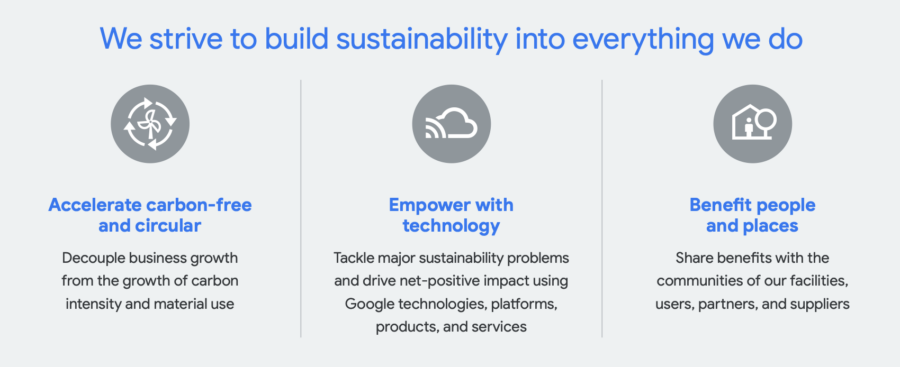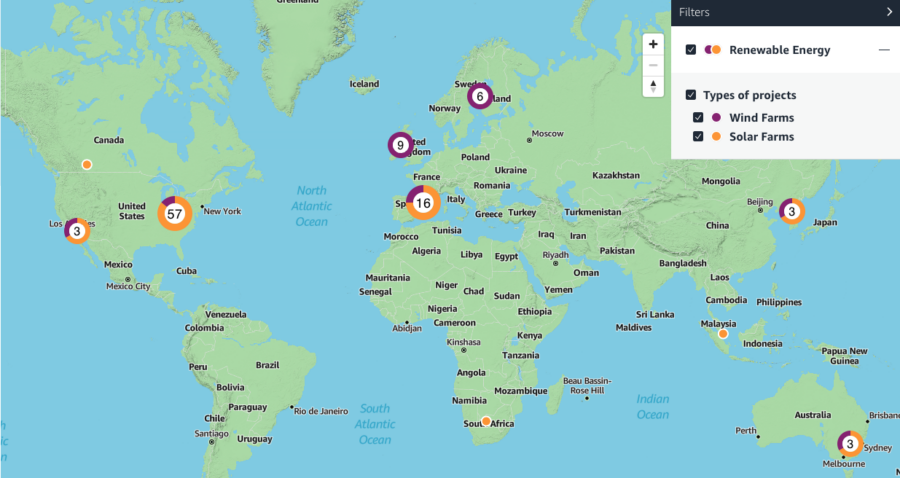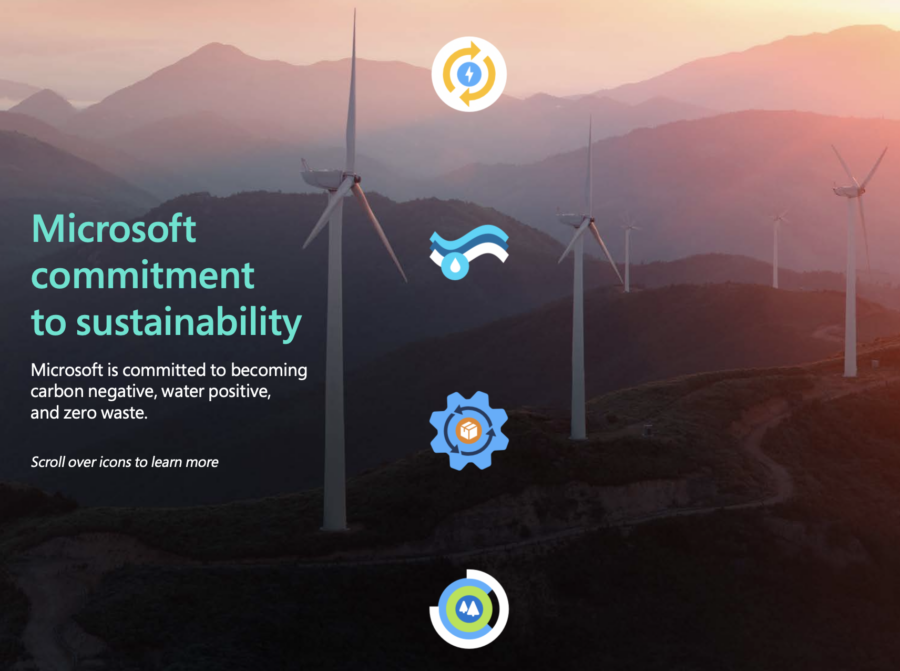How Cloud Technology Enables Organizations to Reducing Their Ecological Footprint
In recent years, sustainability has become one of the most relevant topics for businesses all over the world. More and more organizations take their responsibilities by setting Environmental, Societal, and Governance (ESG) goals. With the continued increase of cloud adoption, it is important to take a look at the developments around sustainability in the domain of cloud technology.
In this article, we dive into the specific measures that cloud giants like AWS, Microsoft, and Google are taking to reduce their footprint. We will indicate several opportunities sustainability brings to businesses. Finally, we will also look at the trend of FinOps, a practice that supports organizations to use the cloud in the most optimized way.
Whilst a few years ago climate and sustainability action might have been linked with activism or politics, it has now become a business path.
Jen Bennet, Google Cloud sustainability lead said “What we’re starting to see is there are many cases where sustainability is actually the right business. It’s good for business and the planet”.
Ecological Footprint of a Data Center
Data centers require a large amount of energy to run. In fact, estimates suggest that by 2025, the technology sector could be responsible for consuming 20% of the world’s total electricity . So what is the future of cloud computing and data centers? Dale Sartor, scientist at the Lawrence Berkeley National Laboratory, stressed the increasing demand for computation.
“The chances that we’re going to see an explosion in energy use sometime in the next couple of decades is pretty high,” said Sartor.
In fact, data usage has been increasing over the past years, with no sign of slowing down. More and more companies are migrating to the cloud and using data centers to store data. However, migrating to the cloud could actually decrease the ecological footprint. The migration of workloads from on-premises to cloud will sow seeds of the circular business model. This could drastically improve the sustainability credentials of businesses by reducing carbon emissions as compared to on-premises.
Cloud Giants That Leave Small Footprints
Within the Cloud providers, there are three main giants, Amazon Web Service, Microsoft Azure, and Google Cloud Platform. In recent years, all three have been advocating for more of a green footprint, as sustainability goals may be used for marketing and business purposes. Sid Nag, research vice president at Gartner, an IT consulting firm, also commented on this new sustainability push by Tech giants.
“We’re seeing a lot of pushback from companies who say they don’t want to be doing business with a cloud provider that doesn’t make sustainability a cornerstone of their offering”.
The sustainability mission and efforts of tech giants such as Amazon, Microsoft, and Google can definitely make an impact on the future of data and sustainability, but will it be enough to reduce energy consumption?!
GCP: Carbon-Free by 2030
Google Cloud has made sustainability one of the cornerstones of the business. Its noble mission is to have all its Data Centers running carbon-free energy by 2030. “ Already in 2016, Google started a partnership with Dutch energy provider Eneco to have a Dutch-based data center all wind-powered by a 720 million wind farm in Delfzijl.
“We already have 90% of all Benelux data centers carbon-free,” recently said Bas Baars, Head of Marketing EMEA South (acting), Google Cloud.
Furthermore, through new features offered by Google Cloud, its customers can measure the carbon footprint of their cloud deployment.
Read more about the GCP Sustainability Mission.
AWS: The Climate Pledge
Amazon also has a commitment, The Climate Pledge, started in 2019, focusing on achieving net-zero carbon emissions by 2040. In 2019, Amazon achieved 65% renewable energy across its operations. In 2020, Amazon became the world’s largest corporate buyer of renewable energy, reaching 65% renewable energy across our business.
Kara Hurst, Vice President,Worldwide Sustainability at Amazon, said “This is the start of a defining and decisive decade. The COVID-19 pandemic dramatically impacted our lives and businesses, but it has also brought about a moment of pause and an opportunity to reconsider the resiliency of both humankind and our planet. By keeping the past year’s learnings in mind, we can successfully address societal shifts, avoid the worst impacts of climate change, and meet the Sustainable Development Goals”.
Read more about AWS and the Climate Pledge.
Azure: Carbon-Negative by 2030
Microsoft sets the bar even higher, for them, being carbon neutral is not enough. Azure, as a part of Microsoft, has been 100 percent carbon neutral since 2012. This means removing as much carbon each year, either by carbon removal (carbon offsetting) or reducing carbon emissions. The goal is that by 2030, Azure will remove more carbon each year than it emits. Brandon Potter, head of product for Microsoft Cloud for Sustainability talked about the mission.
“Microsoft has been helping customers digitally transform other areas of business for years, and with Cloud for Sustainability we’re here to help them accelerate their sustainability transformation journey”. Potter then added “This journey starts with a need to solve deep data challenges, gain rich insights into the data and take action on those insights. Cloud for Sustainability delivers a comprehensive integrated and automated solution to managing your business carbon footprint.”
Read more about Microsoft Azure commitment to Sustainability.
FinOps: The Practice of Getting More While Consuming Less
FinOps is a cultural practice. It’s the way for teams to manage their cloud costs, where everyone takes ownership of their cloud usage supported by a central best-practices group. FinOps aims at making faster product delivery, while at the same time gaining more financial control and predictability. By optimizing cloud infrastructure, companies can both control costs and improve environmental performance. GreenOps uses a FinOps approach to reduce the carbon footprint of the resources running on the cloud by cloud users. A few solutions can be:
- By optimizing the usage of cloud resources such as right-sizing, switching off resources during idle hours
- Choosing a region which utilizes renewable energy
- Using/developing energy efficient architecture for the workloads
- Using intelligent and cloud native solutions such as event driven, serverless technologies
- Using compute efficient languages such as C, C++, Rust etc. to reduce usage of compute resources
Read more about FinOps and GreenOps in an article written by Xebia Cloud Consultant Mudit Gupta.
Sustainable Brands Are Good for Business
Why is sustainability the right strategy going forward for a company? Well, it is not only a way of combating climate change but focusing on sustainability strategies can also create strong business values. Sustainability can be used for employer branding, but it can also be used as a way of reducing energy consumption and cutting costs.
A Sustainable Employer Brand
The new generation is very much concerned with the environment. There is a high likelihood that the CEOs and CTOs of the future will be much more concerned with the ecosystem than the previous generations. This shows that corporate brands can increase their values tremendously by focusing on sustainability. Companies that embed sustainability into their business models can have a lasting competitive advantage.
There is a changing trend among consumers toward supporting sustainability. Building sustainability into business units can increase an organization’s chance of profiting from its sustainability activities. It is also good to be transparent about sustainability activities. Being sustainable can also improve relations with the government and the local community. It can get the company tax incentives and subsidies.
“Companies have an obligation to report on the amount of green energy they consume. To prove this, organizations purchase renewable energy certificates. Renewable energy that is produced, is reported to a registry. Typically, there is one for every country. Energy producing companies generate energy and when they report it, they receive a certificate to prove this fact “said Anton Fedorov, CTO at Cerqlar.
Cerqlar is an Amsterdam based sustainable IT services and consulting company that has collaborated with Xebia in the past and shared their story during a recent event.
The Business Case of Sustainability
Sustainability can also be achieved through the use of technology, maximizing profit and reducing energy emissions. This was the case of the collaboration between Xebia and Bakker Goedhart, a Dutch family-based food supplier company specializing in bread and pastries. By using machine learning models, Xebia predicted the consumer demand of bread per-day and per retailer. This way they know how much product to get, decreasing their costs as well as the amount of food being thrown away.
“We trust that sustainability as a mission can also be achieved by using technology smartly, to increase efficiency, to cut costs and to save energy, hence making our own positive impact,” said Walter van de Scheer, Chief Marketing of Xebia Data and Cloud.
Sustainability Journey
It is clear that cloud providers, as well as organizations, are seeing the benefits of sustainability, from both. an environmental perspective and a commercial one. Through the sustainability efforts of tech companies and the right attitude towards a more green future, energy consumption can be decreased, but only time will tell! Xebia understands the importance of sustainability not only as an ethical mission but also as a business case. By using our tech expertise, we assist clients to achieve their sustainability mission and allow us to contribute and do our part to decrease the over-consumption of energy and goods. Are you interested in the opportunities of sustainability to decrease your carbon footprint, lower your cloud bill or change your perspective on business processes? Get in touch with Xebia to start your sustainability journey!








